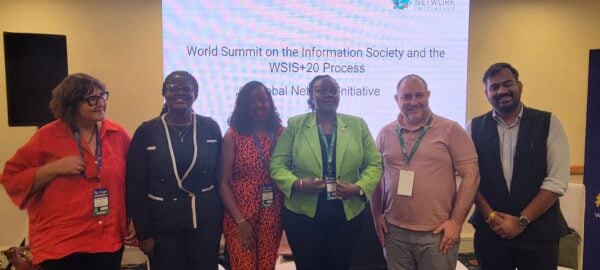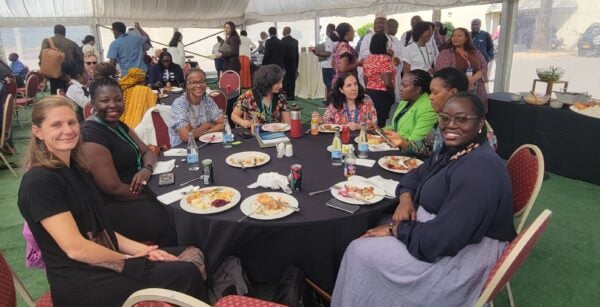By Elonnai Hickok, Managing Director, Global Network Initiative (GNI)
The Forum on Internet Freedom in Africa (FIFAfrica) 2025, held in Windhoek, Namibia and organized by CIPESA, a member of the Global Network Initiative (GNI), brought into focus the critical intersections between technology, human rights, and governance across the African continent.
Over multiple sessions, participants explored issues spanning digital rights, indigenous identity, access to information, surveillance, artificial intelligence (AI), data governance, digital sovereignty, corporate accountability, and Internet governance. Common threads emerged:
- Adopting multistakeholder, inclusive, evidence-based, and contextually relevant approaches to address both opportunities and harms in the digital space.
- Developing coherent regional policy frameworks that ensure technological innovation is guided by respect for human rights.
- Building enabling technological ecosystems through an emphasis on connectivity, access, and inclusion.
Among the many discussions, three themes stood out as particularly relevant to GNI’s work: Internet Governance, Platform Accountability, and Artificial Intelligence.
Internet Governance

GNI hosted a session highlighting Africa’s role in the WSIS+20 review process. The session speaks to work GNI is undertaking with Global Partners Digital (GPD) to support Global Majority and multistakeholder participation in the WSIS+20 review process. As stakeholders participate in the WSIS+20 review process, strong African engagement remains essential to shaping an open, global, interoperable, and secure Internet that advances development, the achievement of the Sustainable Development Goals (SDGs), and implementing high-level international commitments at the regional and local levels.
With the WSIS+20 Zero Draft now released and negotiations approaching in December, the session examined what is needed to effectively implement the WSIS Action Lines, strengthen national and regional Internet Governance Forums (IGFs), and promote equitable participation in the WSIS framework.
For implementation of the WSIS Action Lines, participants emphasized:
- The importance of long-term financing to sustain the ongoing implementation of WSIS-related initiatives.
- The need to link national, regional, and global initiatives related to WSIS and the achievement of the SDGs to ensure coherence.
- The importance of comprehensive and localized metrics and reporting mechanisms to track progress and document impact.
Lessons from national IGFs across Africa, such as the national IGF in Kenya, highlighted the iterative process that has been taken to sustain these as inclusive, accessible, transparent and robust forums open to all stakeholders to deliberate on issues at the intersection of technology, policy, development, and human rights. The importance of documenting deliberation outcomes and establishing year-to-year throughlines around key issues was emphasized. Such approaches are important to learn from as stakeholders deliberate on what is needed to make the Global IGF more effective and outcome-oriented going forward.
Participants also discussed the challenges faced by civil society in effectively participating, including lack of funding, transparency in processes, and legitimacy, as well as the need to shift from dialogue to action. The challenges faced by global majority governments in securing an equal seat at the table were also examined. These include limited capacity to maintain active participation during lengthy negotiations, navigating political obstacles and other geopolitical dynamics, and managing the complexities between negotiations in New York and Geneva.
Platform Accountability
Platform accountability remains a key challenge across African countries. Participants noted the deepening impact of online digital platforms on individuals, communities, and societies, both positive and negative. Key challenges include:
- Ineffective content moderation in African languages.
- Opaque algorithmic decisions that marginalize cultural voices.
- Insufficient investment in trust & safety in African markets.
- Inconsistent enforcement of community standards.
Encouragingly, regional initiatives are emerging to try and address these issues. The African Commission on Human and Peoples’ Rights (ACHPR), through Resolution 630, is developing Africa-centered, rights-respecting guidelines for digital platforms in the context of information integrity. Such initiatives complement GNI’s ongoing efforts to promote responsible business conduct through multistakeholder accountability.
A landmark decision by the Meta Oversight Board in June 2025 surfaced discussion around culture and automated content moderation. The Board overturned the removal of content related to Namibia’s Himba community, exposing how automated content moderation systems can overlook indigenous identities, practices, and culture. Participants explored complex questions such as can global platforms enable cultural diversity and maintain safe online spaces? And what frameworks can protect against algorithms failing to account for cultural identity?
Speakers called for moderation systems that respect context, intent, and culture, noting that without such safeguards, systems risk reinforcing and functioning with bias and blind spots. Similar concerns have been reflected and voiced in GNI’s work on content moderation and human rights due diligence (HRDD), in which GNI examines how HRDD can be an important tool to identifying and addressing harms emerging from different content moderation techniques and practices.
The Polarities of Artificial Intelligence (AI)
Throughout the week, discussions revealed two striking polarities shaping Africa’s AI landscape.
On one hand, effective and equitable AI development depends on addressing digital divides, including fundamental connectivity, inclusion, access, and digital literacy. Without these, AI risks deepening inequalities and resulting in the pursuit of initiatives that do not have the foundation to be sustainable such as the development of data centers. The absence of large language models (LLMs) in indigenous African languages was highlighted not only as a technical gap but as a deeper symptom of exclusion.
On the other hand, AI is advancing rapidly across the continent. The 2025 State of Internet Freedom in Africa report, Navigating the Implications of AI on Digital Democracy in Africa explores how AI is reshaping civic space and digital rights. To ensure rights-respecting development, participants called for:
- Human rights-centered AI governance and policy.
- Capacity building for local innovation and oversight of the same.
- AI development in African languages.
The importance of continued attention to foundational democratic safeguards, including curbing internet shutdowns, regulating surveillance consistent with international human rights law, enforcing Access to Information legislation, and strengthening judicial capacity, were highlighted. Tools GNI has developed around network disruptions and surveillance can be used by stakeholders to build capacity and ensure government actions are inline with international human rights law. GNI has also begun work to understand the impact of government interventions in AI on human rights.
African participation in global AI processes such as the Global Dialogue on AI, the Scientific Panel, and the India AI Impact Summit, will be essential to ensure African priorities are reflected in international AI frameworks. These processes serve as important forums to maintain attention on access, equity, and rights-respecting AI development and use.
Looking Ahead

Taken together, the discussions at FIFAfrica 2025 underscored that the development, deployment, governance, and impact of technology is deeply tied to democracy, rights, and justice. From AI’s dual nature to the exclusion of indigenous languages and culture from algorithmic systems, from surveillance abuses to the empowerment that comes from Access to Information, the need for rights-based, locally grounded, multistakeholder approaches is clear.